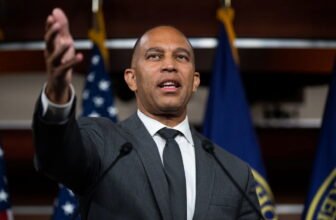
August 30, 2025
Ferguson spent decades fighting for racial justice by challenging school segregation, reversing wrongful convictions, and sparing prisoners from execution.
James E. Ferguson II, a civil rights lawyer who spent decades fighting for racial justice by challenging school segregation, reversing wrongful convictions, and sparing prisoners from execution, died July 21 in Charlotte, N.C. He was 82. His son, James Ferguson III, said the cause was complications of Covid-19 and pneumonia.
Long before earning his law degree, Ferguson was active in the civil rights movement, organizing classmates in the Jim Crow South to integrate libraries, lunch counters, and other public spaces. After graduating from Columbia Law School in 1967—where he recalled being one of fewer than 15 Black students in a class of about 300—he joined Julius Chambers and Adam Stein to form Charlotte’s first racially integrated law firm, according to The New York Times.
“We weren’t practicing law in the abstract,” Ferguson said in Robert Samuel Smith’s book Race, Labor & Civil Rights (2008). “We were the legal arm of the civil rights movement in North Carolina.”
In 1971, Ferguson helped persuade the U.S. Supreme Court to uphold busing as a tool for integrating public schools in Swann v. Charlotte-Mecklenburg Board of Education. The unanimous ruling became a national model for school desegregation efforts. During the case, his law office was torched in an arson attack—no injuries or arrests followed—but Ferguson never forgot the 3 a.m. phone call alerting him to the blaze.
Ferguson also worked on landmark cases overturning wrongful convictions. He helped secure pardons for the Wilmington 10, who spent nearly a decade in prison, and represented the Charlotte Three, whose long sentences were later commuted.
Partnering with the Innocence Project, he introduced DNA evidence and new testimony that led to the 2004 exoneration of Darryl Hunt, who had spent 19 years imprisoned for a murder he did not commit.
“If you do justice to Darryl Hunt, you have done justice to the state, to the prosecution, to your country and yourselves,” Ferguson told an all-white jury during the case.
Beginning in 2011, Ferguson also fought under North Carolina’s Racial Justice Act to reduce death sentences for four inmates, succeeding in having their sentences changed to life imprisonment. “He endured abuses and threats but made everyone feel seen and heard — that is the civil rights movement,” said attorney Sonya Pfeiffer, his law partner. “What he did for schools across the country was extraordinary.”
Beyond the courtroom, Ferguson trained Black lawyers in apartheid-era South Africa, lectured at Harvard Law School, served as general counsel for the ACLU, and led the North Carolina Academy of Trial Lawyers.
“I just want to feel that I’ve done all I can do to bring about equality — for everybody,” Ferguson told The Charlotte Post in 2016. “That’s what life is about — trying to create the society we think we want.”
He is survived by three children, a brother, four grandchildren, and two great-grandchildren. His wife, Barbara, died in 2022.
RELATED CONTENT: Debbie Allen And Phylicia Rashad’s Mother, Vivian Ayers, Dies At 102






